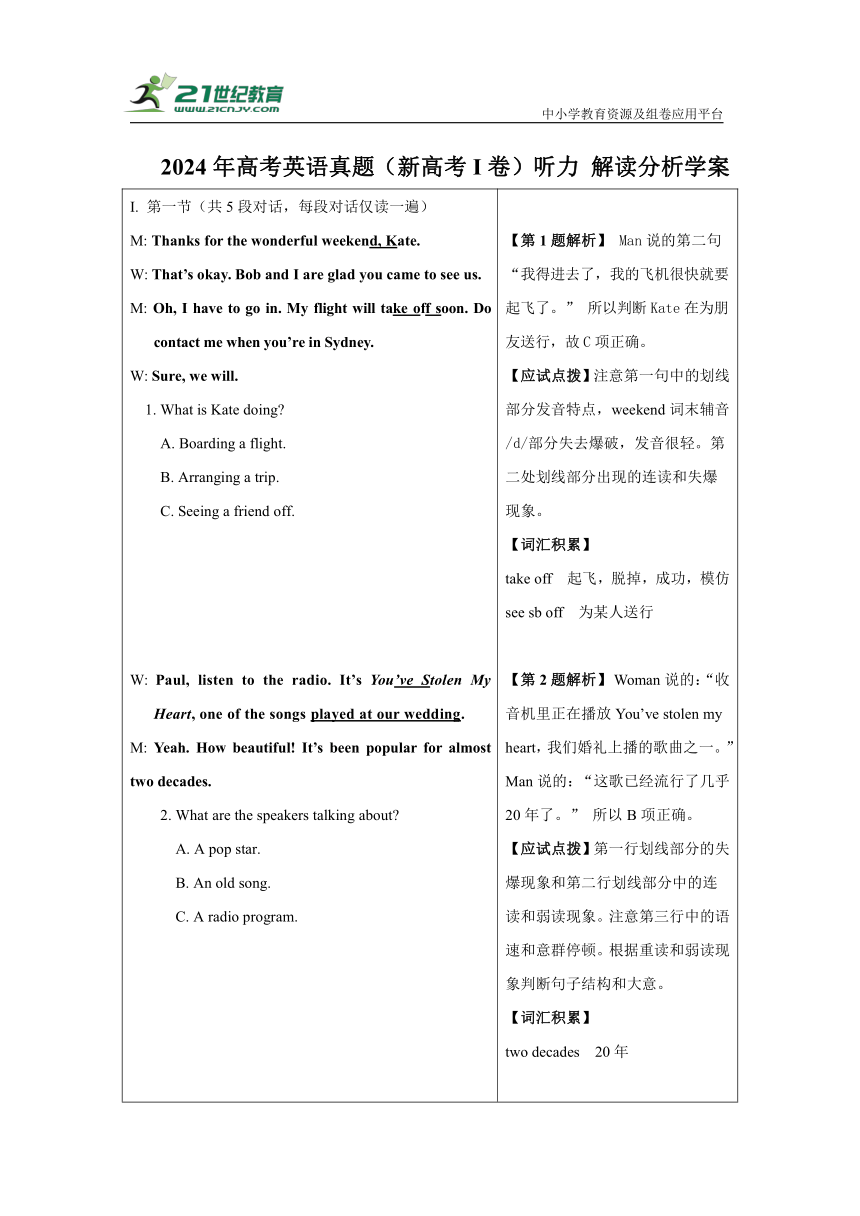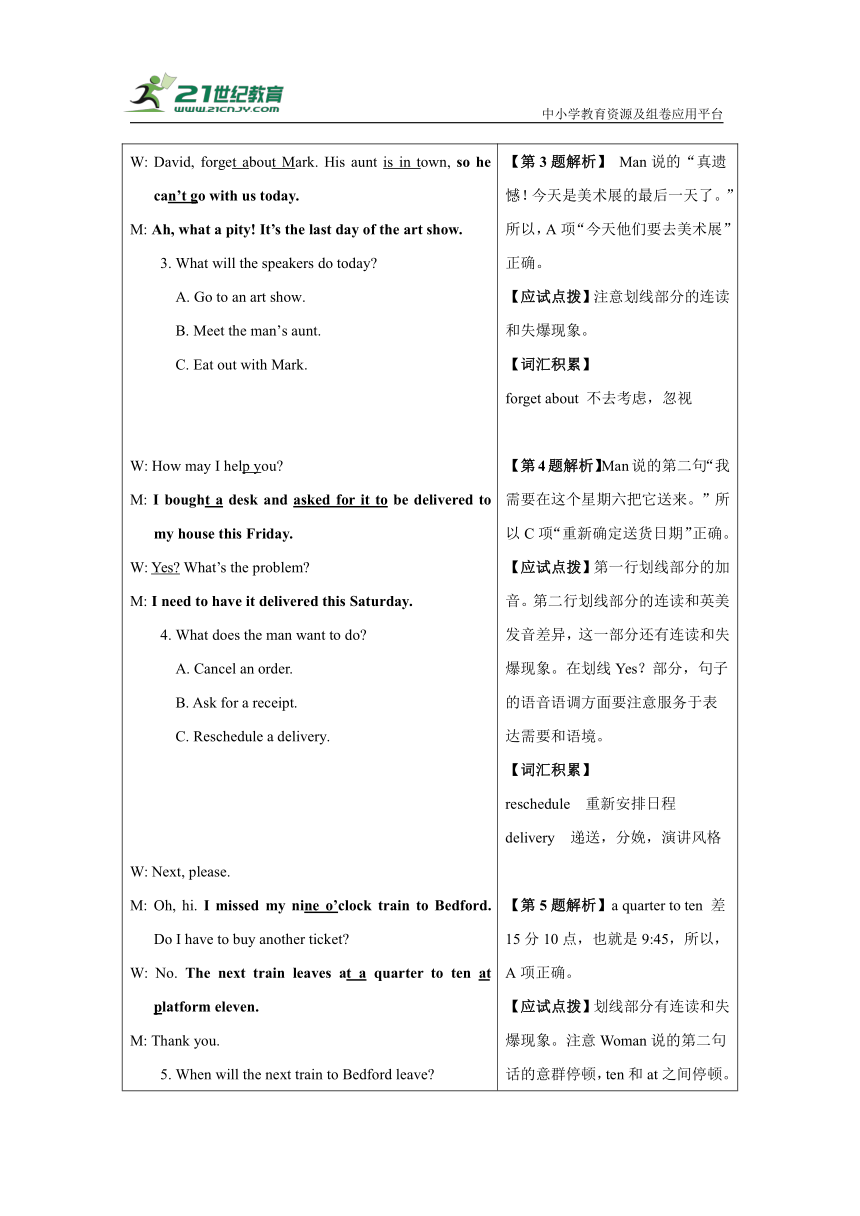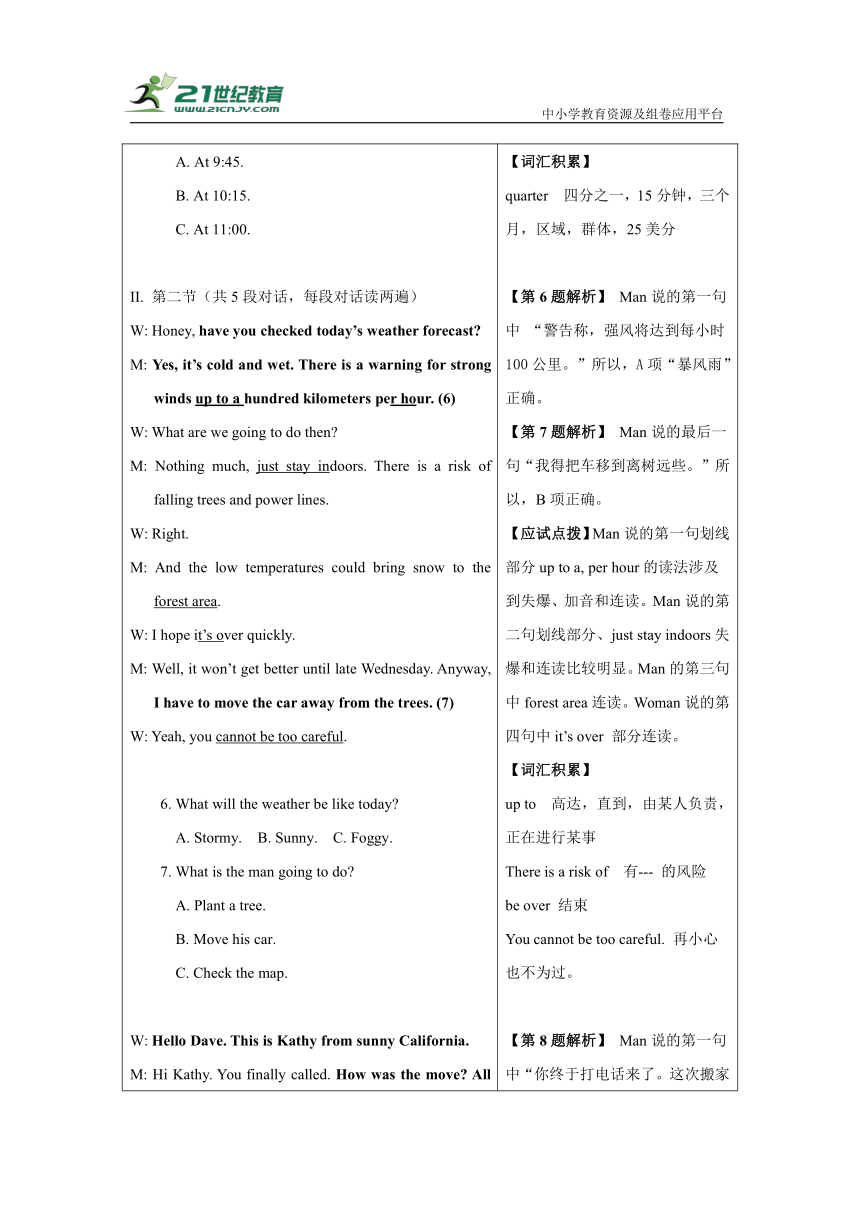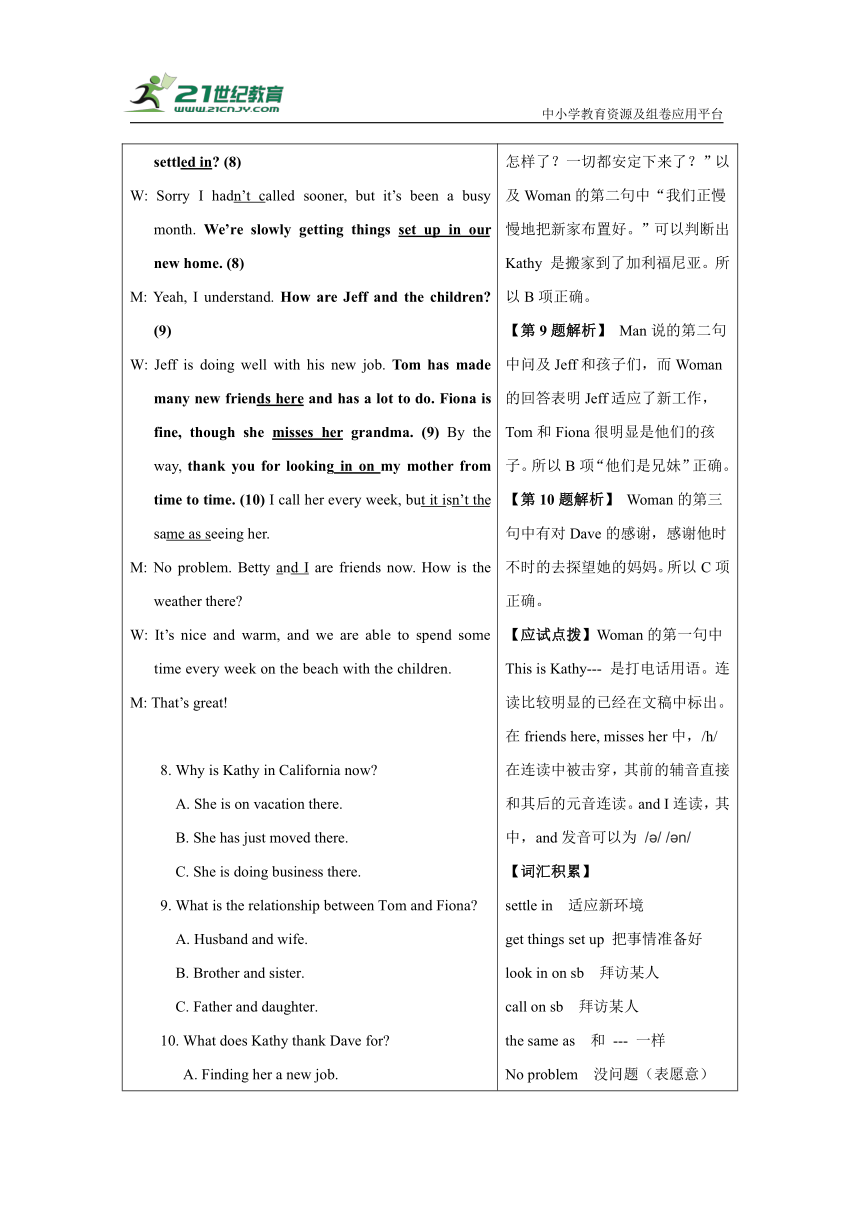2024年高考英语真题(新高考I卷)听力 解读分析学案
文档属性
| 名称 | 2024年高考英语真题(新高考I卷)听力 解读分析学案 |  | |
| 格式 | doc | ||
| 文件大小 | 210.5KB | ||
| 资源类型 | 试卷 | ||
| 版本资源 | 人教版(2019) | ||
| 科目 | 英语 | ||
| 更新时间 | 2024-06-26 15:41:01 | ||
图片预览




文档简介
中小学教育资源及组卷应用平台
2024年高考英语真题(新高考I卷)听力 解读分析学案
I. 第一节(共5段对话,每段对话仅读一遍)M: Thanks for the wonderful weekend, Kate. W: That’s okay. Bob and I are glad you came to see us. M: Oh, I have to go in. My flight will take off soon. Do contact me when you’re in Sydney.W: Sure, we will. 1. What is Kate doing A. Boarding a flight.B. Arranging a trip.C. Seeing a friend off.W: Paul, listen to the radio. It’s You’ve Stolen My Heart, one of the songs played at our wedding. M: Yeah. How beautiful! It’s been popular for almost two decades. 2. What are the speakers talking about A. A pop star.B. An old song.C. A radio program.W: David, forget about Mark. His aunt is in town, so he can’t go with us today.M: Ah, what a pity! It’s the last day of the art show. 3. What will the speakers do today A. Go to an art show.B. Meet the man’s aunt.C. Eat out with Mark.W: How may I help you M: I bought a desk and asked for it to be delivered to my house this Friday. W: Yes What’s the problem M: I need to have it delivered this Saturday. 4. What does the man want to do A. Cancel an order. B. Ask for a receipt.C. Reschedule a delivery.W: Next, please. M: Oh, hi. I missed my nine o’clock train to Bedford. Do I have to buy another ticket W: No. The next train leaves at a quarter to ten at platform eleven. M: Thank you.5. When will the next train to Bedford leave A. At 9:45.B. At 10:15.C. At 11:00.II. 第二节(共5段对话,每段对话读两遍)W: Honey, have you checked today’s weather forecast M: Yes, it’s cold and wet. There is a warning for strong winds up to a hundred kilometers per hour. (6)W: What are we going to do then M: Nothing much, just stay indoors. There is a risk of falling trees and power lines.W: Right.M: And the low temperatures could bring snow to the forest area.W: I hope it’s over quickly.M: Well, it won’t get better until late Wednesday. Anyway, I have to move the car away from the trees. (7)W: Yeah, you cannot be too careful. 6. What will the weather be like today A. Stormy. B. Sunny. C. Foggy.7. What is the man going to do A. Plant a tree. B. Move his car. C. Check the map.W: Hello Dave. This is Kathy from sunny California. M: Hi Kathy. You finally called. How was the move All settled in (8)W: Sorry I hadn’t called sooner, but it’s been a busy month. We’re slowly getting things set up in our new home. (8)M: Yeah, I understand. How are Jeff and the children (9)W: Jeff is doing well with his new job. Tom has made many new friends here and has a lot to do. Fiona is fine, though she misses her grandma. (9) By the way, thank you for looking in on my mother from time to time. (10) I call her every week, but it isn’t the same as seeing her.M: No problem. Betty and I are friends now. How is the weather there W: It’s nice and warm, and we are able to spend some time every week on the beach with the children.M: That’s great! 8. Why is Kathy in California now A. She is on vacation there.B. She has just moved there.C. She is doing business there.9. What is the relationship between Tom and Fiona A. Husband and wife. B. Brother and sister. C. Father and daughter.10. What does Kathy thank Dave for A. Finding her a new job.B. Sending her a present. C. Calling on her mother.W: Jack, how did you get to school when you were in primary school (11)M: I lived close to my school, so I walked every day. (11) Why W: Well, I remember that when we were kids, we often walked, rode a bike or caught the bus to school. Few of us were dropped off at the school gate by our parents. M: I see what you mean. These days, you can see traffic jams around schools at drop-off and pick-up times, but it’s hard to blame the parents. They have good reasons for driving their kids to school, mostly to do with safety and convenience. (12)W: You have a point there, but it could also mean children are missing out on much-needed exercise and other life skills. Some parents are just being overprotective, with their children learning nothing but living in fear of everything. (13) Studies have found that children who spend more time outside tend to be healthier, better adjusted and better at dealing with stress.11. How did Jack go to school when he was a child A. By bike. B. On foot. C. By bus.12. What is Jack’s attitude toward parents driving their kids to school A. Disapproving.B. Encouraging.C. Understanding.13. What is the problem with some parents according to the woman A. Overprotecting their children.B. Pushing their children too hard.C. Having no time for their children.M: So, Marie, your kitchen garden looks excellent. What made you turn to social media to record your vegetable growing (14)W: Initially, I used the online platform as a diary, something to look back on, giving me a sense of achievement and keeping me motivated and moving forward. (14) As time went by, other gardeners and like-minded people began to follow my progress too.M: I know you grow lots of fruit on your land. Which would you recommend to beginners as the best to grow (15)W: Strawberries would be a good choice. They produce a lot of fruit in their first season. (15)M: That’s cool. Well, do you have plans to try new or any particular crops next year W: Next season, I will be adding some pear trees to the fruit area. I will be adding more herbs which I can use in the kitchen. And, after a couple of years of failure, I will try growing carrots again. (16)M: What advice would you offer someone thinking of doing kitchen gardening (17) W: Have a plan of what you want your kitchen garden to look like. Don’t be too discouraged if things don’t go according to plan. Learn from your mistakes and move on. There is always next season. (17) 14. Why did Marie post her kitchen gardening online at first A. To keep records of her progress.B. To sell home-grown vegetables.C. To motivate her fellow gardeners.15. Why does Marie recommend beginners to grow strawberries A. They need no special care.B. They can be used in cooking.C. They bear a lot of fruit soon.16. What is difficult for Marie to grow A. Herbs. B. Carrots. C. Pears.17. What is Marie’s advice to those interested in kitchen gardening A. Aim high.B. Keep focused. C. Stay optimistic.M: Welcome to Meet the Author. Well, many readers of Sports Times turn to the last page of their magazine first in order to read Jacob Johnson’s weekly article under the title “Life of Johnson”. (18) The articles, along with his novels and essay collections, have earned Johnson the reputation as one of the funniest humans on the planet. (19) Johnson began writing about sports as a second-year student at the University of Colorado, covering high school volleyball games for his hometown newspaper. After graduating in 1981, he moved on to work at The Denver Weekly for two years and The Los Angeles Post for two more years before landing at Sports Times. (20) He has been voted National Sportswriter of the Year 11 times. So now let’s welcome the funny man with serious talent — Jacob Johnson.18. What is “Life of Johnson” A. A magazine column.B. A TV series.C. A historical novel.19. What is Johnson famous for A. His acting talent.B. His humorous writing.C. His long sports career.20. When did Johnson join Sports Times A. In 1981.B. In 1983.C. In 1985. 【第1题解析】 Man说的第二句“我得进去了,我的飞机很快就要起飞了。” 所以判断Kate在为朋友送行,故C项正确。【应试点拨】注意第一句中的划线部分发音特点,weekend词末辅音/d/部分失去爆破,发音很轻。第二处划线部分出现的连读和失爆现象。【词汇积累】take off 起飞,脱掉,成功,模仿see sb off 为某人送行【第2题解析】 Woman说的:“收音机里正在播放You’ve stolen my heart,我们婚礼上播的歌曲之一。”Man说的:“这歌已经流行了几乎20年了。” 所以B项正确。【应试点拨】第一行划线部分的失爆现象和第二行划线部分中的连读和弱读现象。注意第三行中的语速和意群停顿。根据重读和弱读现象判断句子结构和大意。【词汇积累】two decades 20年【第3题解析】 Man说的“真遗憾!今天是美术展的最后一天了。” 所以,A项“今天他们要去美术展”正确。【应试点拨】注意划线部分的连读和失爆现象。【词汇积累】forget about 不去考虑,忽视【第4题解析】Man说的第二句“我需要在这个星期六把它送来。”所以C项“重新确定送货日期”正确。【应试点拨】第一行划线部分的加音。第二行划线部分的连读和英美发音差异,这一部分还有连读和失爆现象。在划线Yes?部分,句子的语音语调方面要注意服务于表达需要和语境。【词汇积累】reschedule 重新安排日程delivery 递送,分娩,演讲风格 【第5题解析】a quarter to ten 差15分10点,也就是9:45,所以,A项正确。【应试点拨】划线部分有连读和失爆现象。注意Woman说的第二句话的意群停顿,ten和at之间停顿。【词汇积累】quarter 四分之一,15分钟,三个月,区域,群体,25美分 【第6题解析】 Man说的第一句中 “警告称,强风将达到每小时100公里。”所以,A项“暴风雨”正确。【第7题解析】 Man说的最后一句“我得把车移到离树远些。”所以,B项正确。【应试点拨】Man说的第一句划线部分up to a, per hour的读法涉及到失爆、加音和连读。Man说的第二句划线部分、just stay indoors失爆和连读比较明显。Man的第三句中forest area连读。Woman说的第四句中it’s over 部分连读。【词汇积累】up to 高达,直到,由某人负责,正在进行某事There is a risk of 有--- 的风险be over 结束You cannot be too careful. 再小心也不为过。【第8题解析】 Man说的第一句中“你终于打电话来了。这次搬家怎样了?一切都安定下来了?”以及Woman的第二句中“我们正慢慢地把新家布置好。”可以判断出Kathy 是搬家到了加利福尼亚。所以B项正确。【第9题解析】 Man说的第二句中问及Jeff和孩子们,而Woman的回答表明Jeff适应了新工作,Tom和Fiona很明显是他们的孩子。所以B项“他们是兄妹”正确。【第10题解析】 Woman的第三句中有对Dave的感谢,感谢他时不时的去探望她的妈妈。所以C项正确。【应试点拨】Woman的第一句中This is Kathy--- 是打电话用语。连读比较明显的已经在文稿中标出。 在friends here, misses her中,/h/在连读中被击穿,其前的辅音直接和其后的元音连读。and I连读,其中,and发音可以为 / / / n/ 【词汇积累】settle in 适应新环境get things set up 把事情准备好look in on sb 拜访某人call on sb 拜访某人the same as 和 --- 一样No problem 没问题(表愿意)【第11题解析】对话前两句,一问一答中明确提及“我每天走着去上学。”所以,B项“步行”正确。【第12题解析】 Man说的第二句中提及“很难责备父母。他们有充分的理由开车送孩子上学,大部分和安全和便利有关。”所以C项Jack对父母开车送孩子上学是“理解的”正确。【第13题解析】 Woman说的第三句中提及了她对父母开车送孩子上学的弊端:孩子们缺少了必要的锻炼;部分父母过分保护使孩子活在恐惧中;研究结果发现孩子们常在室外活动更好。照她看来,父母带来的麻烦是过分的保护孩子了。所以,A项正确。【应试点拨】一些连读和失爆现象在文稿部分标出了。但并不是所有可以连读失爆的地方都会连读失爆,必须服从于意群停顿和语义的表达需要。【词汇积累】primary school 小学drop off 送到,放下,减少,入睡I see 我明白了at drop-off and pick-up times 在送和接孩子的时间段里to do with safety 和安全有关have a point 有道理miss out on sth 错失---better adjusted 更好的适应【第14题解析】 Woman(Marie)回答Man的第一个采访提问(什么使你在媒体上记录自己的蔬菜的生长)时说“最初,我把这个在线平台当作日记,用来回顾 --- ”Marie把自己的厨房菜园发到网上是为了做个记录。所以,A项正确。【第15题解析】Woman(Marie)回答第二个问题(给新手推荐种什么)时说:“草莓是个不错的选择。它们在第一季就能结出很多果实。”所以,C项“它们很快就能结很多果”正确。【第16题解析】 Woman(Marie)回答采访的第三个问题(下一年种什么)时提及“经过几年的失败,我将再次尝试种植胡萝卜。”可以得知,对于Marie来说或萝卜难种。所以,B项正确。【第17题解析】 Woman(Marie)回答采访的第四个问题(给想种植菜园的人什么建议)时说如果不成功,“不要过于气馁。从错误中吸取教训,继续前进。总会有下一个季节的。”所以C项“保持乐观”正确。【应试点拨】连读和失爆现象在文稿部分标出了,对照音频部分印证。So, Well, 等可以在口语中开始一个话题。failure中的 /l/ 发音在英音中常发弱音,和美音有较大差异。句子中也有重读和弱读现象,有起伏和节奏,注意和音频部分印证。【词汇积累】 turn to sth/doing/sb 开始做,致力于,转而,求助online platform 网上平台look back on sth 回顾,回忆keep motivated 保持有动力like-minded 志趣相投的season 蔬菜的采摘期,季节,赛季,上映期【第18题解析】在短文开头提及了读者们拿到这本杂志要先去读他的“Life of Johnson 专栏里的每周文章”, 所以,A项“一个杂志专栏”是正确选项。【第19题解析】他的文章和作品为他赢得了“地球上最有趣的人之一”的声誉。所以,B项“他的幽默写作风格”是正确选项。 【第20题解析】根据短文内容1981+2+2=1985. 可以判断出他加入到Sports Times 是1985年。所以,C项是正确选项。【应试点拨】meet the author 是栏目名称,Life of Johnson是专栏名称。last和after是美音,音频中还有很多含有/r/发音的美音,注意积累和习惯。and和as及其后的部分在这儿重读了。其他的连读等语音现象在文稿中已经标出。【词汇积累】under the title 在标题或专栏下earn sb the reputation 为某人赢得声誉cover games 采访比赛land 赢得工作,着陆,跌落serious talent 非常出色的才华
【语音知识】1. 常见连读现象:词末辅音和词首元音或半元音连读,比如:Not at all. this year, 等。 词尾r/re和词首元音,比如: far away 等,这样的例子在听力中有很多。另外,词尾辅音还可以击摩擦音/h/,直接和其后元音连读,比如:come (h)ere. (注意,并不是必须连读。语速、强调、意群停顿都会影响到连读。)2. 失爆现象:/p,b; k,g; t,d/相邻时,或和摩擦音等其他辅音时,前一个辅音只做口型,马上发出后一个辅音,这样的例子在听力部分中有很多,比如:art show. 3. 加音现象:两个元音之间加/j/或/w/,使语流连贯,比如:go(w)away, the(j)other 4. 变音现象:因为相邻音素影响,轻浊音之间会有转化,比如:school中/k/转变为/g/,did you 中/d/转变为/d /等。5. 省音现象:非重读音节中的某些元音或词末辅音在语速较快时常发生省音现象,比如:can’t go中,n’t 部分的发音经常被省略;going to do 也可“挤”在一起,变成gonna do.等。6.重读和弱读现象:句子中重要的实词和要表达强调的部分往往重读,不重要的虚词往往弱读,长音变短音甚至省略。 当然,发音和语速、意群停顿、情绪、情感、语境、个人背景、交流对象、等都有关系,变化丰富,常见并不见得是规律,规律并不见得是必须。了解一些,提升听力而已。 【练习和应试】练习方法:1. 模仿。使自己的发音习惯和听力材料里的发音类似,就容易听出准确的内容。 2. 不翻译、不回想,了解大意和逻辑。 3. 即时跟读,尤其是重读的句子部分,跟上节奏,了解大意。4. 积累和分析。尤其是听错部分的回听和分析,注意积累发音和词汇方面的知识。5. 有意识提升和重视。听力的提升最终要靠语音和词汇,简单的“磨耳朵”是不能真正解决听力问题的,对于一个30分分值的题型,要有方法和行动。应试策略:1. 心态。心情平静专注,坦然镇定,在听力部分不要给自己设定目标或要求。2. 预测。从拿到试卷开始,到试音、举例到“现在,你有5秒钟的时间阅读第一小题的有关内容。”一般大约有7-8分钟的时间, 这段时间里,要认真阅读听力部分的全部内容,尤其是题干和选项之间的可能关系要积极预测。 3. 果断:不翻译、不回想,听懂大意和逻辑,果断选定,马上准备下一题。对于一些的确没有听明白的部分,不要着急回忆刚听到的内容,根据语气和逻辑判断,果断确定选项,不犹豫。 4. 涂卡。按部就班,有序操作。
2024年高考英语真题(新高考I卷)听力 解读分析学案
I. 第一节(共5段对话,每段对话仅读一遍)M: Thanks for the wonderful weekend, Kate. W: That’s okay. Bob and I are glad you came to see us. M: Oh, I have to go in. My flight will take off soon. Do contact me when you’re in Sydney.W: Sure, we will. 1. What is Kate doing A. Boarding a flight.B. Arranging a trip.C. Seeing a friend off.W: Paul, listen to the radio. It’s You’ve Stolen My Heart, one of the songs played at our wedding. M: Yeah. How beautiful! It’s been popular for almost two decades. 2. What are the speakers talking about A. A pop star.B. An old song.C. A radio program.W: David, forget about Mark. His aunt is in town, so he can’t go with us today.M: Ah, what a pity! It’s the last day of the art show. 3. What will the speakers do today A. Go to an art show.B. Meet the man’s aunt.C. Eat out with Mark.W: How may I help you M: I bought a desk and asked for it to be delivered to my house this Friday. W: Yes What’s the problem M: I need to have it delivered this Saturday. 4. What does the man want to do A. Cancel an order. B. Ask for a receipt.C. Reschedule a delivery.W: Next, please. M: Oh, hi. I missed my nine o’clock train to Bedford. Do I have to buy another ticket W: No. The next train leaves at a quarter to ten at platform eleven. M: Thank you.5. When will the next train to Bedford leave A. At 9:45.B. At 10:15.C. At 11:00.II. 第二节(共5段对话,每段对话读两遍)W: Honey, have you checked today’s weather forecast M: Yes, it’s cold and wet. There is a warning for strong winds up to a hundred kilometers per hour. (6)W: What are we going to do then M: Nothing much, just stay indoors. There is a risk of falling trees and power lines.W: Right.M: And the low temperatures could bring snow to the forest area.W: I hope it’s over quickly.M: Well, it won’t get better until late Wednesday. Anyway, I have to move the car away from the trees. (7)W: Yeah, you cannot be too careful. 6. What will the weather be like today A. Stormy. B. Sunny. C. Foggy.7. What is the man going to do A. Plant a tree. B. Move his car. C. Check the map.W: Hello Dave. This is Kathy from sunny California. M: Hi Kathy. You finally called. How was the move All settled in (8)W: Sorry I hadn’t called sooner, but it’s been a busy month. We’re slowly getting things set up in our new home. (8)M: Yeah, I understand. How are Jeff and the children (9)W: Jeff is doing well with his new job. Tom has made many new friends here and has a lot to do. Fiona is fine, though she misses her grandma. (9) By the way, thank you for looking in on my mother from time to time. (10) I call her every week, but it isn’t the same as seeing her.M: No problem. Betty and I are friends now. How is the weather there W: It’s nice and warm, and we are able to spend some time every week on the beach with the children.M: That’s great! 8. Why is Kathy in California now A. She is on vacation there.B. She has just moved there.C. She is doing business there.9. What is the relationship between Tom and Fiona A. Husband and wife. B. Brother and sister. C. Father and daughter.10. What does Kathy thank Dave for A. Finding her a new job.B. Sending her a present. C. Calling on her mother.W: Jack, how did you get to school when you were in primary school (11)M: I lived close to my school, so I walked every day. (11) Why W: Well, I remember that when we were kids, we often walked, rode a bike or caught the bus to school. Few of us were dropped off at the school gate by our parents. M: I see what you mean. These days, you can see traffic jams around schools at drop-off and pick-up times, but it’s hard to blame the parents. They have good reasons for driving their kids to school, mostly to do with safety and convenience. (12)W: You have a point there, but it could also mean children are missing out on much-needed exercise and other life skills. Some parents are just being overprotective, with their children learning nothing but living in fear of everything. (13) Studies have found that children who spend more time outside tend to be healthier, better adjusted and better at dealing with stress.11. How did Jack go to school when he was a child A. By bike. B. On foot. C. By bus.12. What is Jack’s attitude toward parents driving their kids to school A. Disapproving.B. Encouraging.C. Understanding.13. What is the problem with some parents according to the woman A. Overprotecting their children.B. Pushing their children too hard.C. Having no time for their children.M: So, Marie, your kitchen garden looks excellent. What made you turn to social media to record your vegetable growing (14)W: Initially, I used the online platform as a diary, something to look back on, giving me a sense of achievement and keeping me motivated and moving forward. (14) As time went by, other gardeners and like-minded people began to follow my progress too.M: I know you grow lots of fruit on your land. Which would you recommend to beginners as the best to grow (15)W: Strawberries would be a good choice. They produce a lot of fruit in their first season. (15)M: That’s cool. Well, do you have plans to try new or any particular crops next year W: Next season, I will be adding some pear trees to the fruit area. I will be adding more herbs which I can use in the kitchen. And, after a couple of years of failure, I will try growing carrots again. (16)M: What advice would you offer someone thinking of doing kitchen gardening (17) W: Have a plan of what you want your kitchen garden to look like. Don’t be too discouraged if things don’t go according to plan. Learn from your mistakes and move on. There is always next season. (17) 14. Why did Marie post her kitchen gardening online at first A. To keep records of her progress.B. To sell home-grown vegetables.C. To motivate her fellow gardeners.15. Why does Marie recommend beginners to grow strawberries A. They need no special care.B. They can be used in cooking.C. They bear a lot of fruit soon.16. What is difficult for Marie to grow A. Herbs. B. Carrots. C. Pears.17. What is Marie’s advice to those interested in kitchen gardening A. Aim high.B. Keep focused. C. Stay optimistic.M: Welcome to Meet the Author. Well, many readers of Sports Times turn to the last page of their magazine first in order to read Jacob Johnson’s weekly article under the title “Life of Johnson”. (18) The articles, along with his novels and essay collections, have earned Johnson the reputation as one of the funniest humans on the planet. (19) Johnson began writing about sports as a second-year student at the University of Colorado, covering high school volleyball games for his hometown newspaper. After graduating in 1981, he moved on to work at The Denver Weekly for two years and The Los Angeles Post for two more years before landing at Sports Times. (20) He has been voted National Sportswriter of the Year 11 times. So now let’s welcome the funny man with serious talent — Jacob Johnson.18. What is “Life of Johnson” A. A magazine column.B. A TV series.C. A historical novel.19. What is Johnson famous for A. His acting talent.B. His humorous writing.C. His long sports career.20. When did Johnson join Sports Times A. In 1981.B. In 1983.C. In 1985. 【第1题解析】 Man说的第二句“我得进去了,我的飞机很快就要起飞了。” 所以判断Kate在为朋友送行,故C项正确。【应试点拨】注意第一句中的划线部分发音特点,weekend词末辅音/d/部分失去爆破,发音很轻。第二处划线部分出现的连读和失爆现象。【词汇积累】take off 起飞,脱掉,成功,模仿see sb off 为某人送行【第2题解析】 Woman说的:“收音机里正在播放You’ve stolen my heart,我们婚礼上播的歌曲之一。”Man说的:“这歌已经流行了几乎20年了。” 所以B项正确。【应试点拨】第一行划线部分的失爆现象和第二行划线部分中的连读和弱读现象。注意第三行中的语速和意群停顿。根据重读和弱读现象判断句子结构和大意。【词汇积累】two decades 20年【第3题解析】 Man说的“真遗憾!今天是美术展的最后一天了。” 所以,A项“今天他们要去美术展”正确。【应试点拨】注意划线部分的连读和失爆现象。【词汇积累】forget about 不去考虑,忽视【第4题解析】Man说的第二句“我需要在这个星期六把它送来。”所以C项“重新确定送货日期”正确。【应试点拨】第一行划线部分的加音。第二行划线部分的连读和英美发音差异,这一部分还有连读和失爆现象。在划线Yes?部分,句子的语音语调方面要注意服务于表达需要和语境。【词汇积累】reschedule 重新安排日程delivery 递送,分娩,演讲风格 【第5题解析】a quarter to ten 差15分10点,也就是9:45,所以,A项正确。【应试点拨】划线部分有连读和失爆现象。注意Woman说的第二句话的意群停顿,ten和at之间停顿。【词汇积累】quarter 四分之一,15分钟,三个月,区域,群体,25美分 【第6题解析】 Man说的第一句中 “警告称,强风将达到每小时100公里。”所以,A项“暴风雨”正确。【第7题解析】 Man说的最后一句“我得把车移到离树远些。”所以,B项正确。【应试点拨】Man说的第一句划线部分up to a, per hour的读法涉及到失爆、加音和连读。Man说的第二句划线部分、just stay indoors失爆和连读比较明显。Man的第三句中forest area连读。Woman说的第四句中it’s over 部分连读。【词汇积累】up to 高达,直到,由某人负责,正在进行某事There is a risk of 有--- 的风险be over 结束You cannot be too careful. 再小心也不为过。【第8题解析】 Man说的第一句中“你终于打电话来了。这次搬家怎样了?一切都安定下来了?”以及Woman的第二句中“我们正慢慢地把新家布置好。”可以判断出Kathy 是搬家到了加利福尼亚。所以B项正确。【第9题解析】 Man说的第二句中问及Jeff和孩子们,而Woman的回答表明Jeff适应了新工作,Tom和Fiona很明显是他们的孩子。所以B项“他们是兄妹”正确。【第10题解析】 Woman的第三句中有对Dave的感谢,感谢他时不时的去探望她的妈妈。所以C项正确。【应试点拨】Woman的第一句中This is Kathy--- 是打电话用语。连读比较明显的已经在文稿中标出。 在friends here, misses her中,/h/在连读中被击穿,其前的辅音直接和其后的元音连读。and I连读,其中,and发音可以为 / / / n/ 【词汇积累】settle in 适应新环境get things set up 把事情准备好look in on sb 拜访某人call on sb 拜访某人the same as 和 --- 一样No problem 没问题(表愿意)【第11题解析】对话前两句,一问一答中明确提及“我每天走着去上学。”所以,B项“步行”正确。【第12题解析】 Man说的第二句中提及“很难责备父母。他们有充分的理由开车送孩子上学,大部分和安全和便利有关。”所以C项Jack对父母开车送孩子上学是“理解的”正确。【第13题解析】 Woman说的第三句中提及了她对父母开车送孩子上学的弊端:孩子们缺少了必要的锻炼;部分父母过分保护使孩子活在恐惧中;研究结果发现孩子们常在室外活动更好。照她看来,父母带来的麻烦是过分的保护孩子了。所以,A项正确。【应试点拨】一些连读和失爆现象在文稿部分标出了。但并不是所有可以连读失爆的地方都会连读失爆,必须服从于意群停顿和语义的表达需要。【词汇积累】primary school 小学drop off 送到,放下,减少,入睡I see 我明白了at drop-off and pick-up times 在送和接孩子的时间段里to do with safety 和安全有关have a point 有道理miss out on sth 错失---better adjusted 更好的适应【第14题解析】 Woman(Marie)回答Man的第一个采访提问(什么使你在媒体上记录自己的蔬菜的生长)时说“最初,我把这个在线平台当作日记,用来回顾 --- ”Marie把自己的厨房菜园发到网上是为了做个记录。所以,A项正确。【第15题解析】Woman(Marie)回答第二个问题(给新手推荐种什么)时说:“草莓是个不错的选择。它们在第一季就能结出很多果实。”所以,C项“它们很快就能结很多果”正确。【第16题解析】 Woman(Marie)回答采访的第三个问题(下一年种什么)时提及“经过几年的失败,我将再次尝试种植胡萝卜。”可以得知,对于Marie来说或萝卜难种。所以,B项正确。【第17题解析】 Woman(Marie)回答采访的第四个问题(给想种植菜园的人什么建议)时说如果不成功,“不要过于气馁。从错误中吸取教训,继续前进。总会有下一个季节的。”所以C项“保持乐观”正确。【应试点拨】连读和失爆现象在文稿部分标出了,对照音频部分印证。So, Well, 等可以在口语中开始一个话题。failure中的 /l/ 发音在英音中常发弱音,和美音有较大差异。句子中也有重读和弱读现象,有起伏和节奏,注意和音频部分印证。【词汇积累】 turn to sth/doing/sb 开始做,致力于,转而,求助online platform 网上平台look back on sth 回顾,回忆keep motivated 保持有动力like-minded 志趣相投的season 蔬菜的采摘期,季节,赛季,上映期【第18题解析】在短文开头提及了读者们拿到这本杂志要先去读他的“Life of Johnson 专栏里的每周文章”, 所以,A项“一个杂志专栏”是正确选项。【第19题解析】他的文章和作品为他赢得了“地球上最有趣的人之一”的声誉。所以,B项“他的幽默写作风格”是正确选项。 【第20题解析】根据短文内容1981+2+2=1985. 可以判断出他加入到Sports Times 是1985年。所以,C项是正确选项。【应试点拨】meet the author 是栏目名称,Life of Johnson是专栏名称。last和after是美音,音频中还有很多含有/r/发音的美音,注意积累和习惯。and和as及其后的部分在这儿重读了。其他的连读等语音现象在文稿中已经标出。【词汇积累】under the title 在标题或专栏下earn sb the reputation 为某人赢得声誉cover games 采访比赛land 赢得工作,着陆,跌落serious talent 非常出色的才华
【语音知识】1. 常见连读现象:词末辅音和词首元音或半元音连读,比如:Not at all. this year, 等。 词尾r/re和词首元音,比如: far away 等,这样的例子在听力中有很多。另外,词尾辅音还可以击摩擦音/h/,直接和其后元音连读,比如:come (h)ere. (注意,并不是必须连读。语速、强调、意群停顿都会影响到连读。)2. 失爆现象:/p,b; k,g; t,d/相邻时,或和摩擦音等其他辅音时,前一个辅音只做口型,马上发出后一个辅音,这样的例子在听力部分中有很多,比如:art show. 3. 加音现象:两个元音之间加/j/或/w/,使语流连贯,比如:go(w)away, the(j)other 4. 变音现象:因为相邻音素影响,轻浊音之间会有转化,比如:school中/k/转变为/g/,did you 中/d/转变为/d /等。5. 省音现象:非重读音节中的某些元音或词末辅音在语速较快时常发生省音现象,比如:can’t go中,n’t 部分的发音经常被省略;going to do 也可“挤”在一起,变成gonna do.等。6.重读和弱读现象:句子中重要的实词和要表达强调的部分往往重读,不重要的虚词往往弱读,长音变短音甚至省略。 当然,发音和语速、意群停顿、情绪、情感、语境、个人背景、交流对象、等都有关系,变化丰富,常见并不见得是规律,规律并不见得是必须。了解一些,提升听力而已。 【练习和应试】练习方法:1. 模仿。使自己的发音习惯和听力材料里的发音类似,就容易听出准确的内容。 2. 不翻译、不回想,了解大意和逻辑。 3. 即时跟读,尤其是重读的句子部分,跟上节奏,了解大意。4. 积累和分析。尤其是听错部分的回听和分析,注意积累发音和词汇方面的知识。5. 有意识提升和重视。听力的提升最终要靠语音和词汇,简单的“磨耳朵”是不能真正解决听力问题的,对于一个30分分值的题型,要有方法和行动。应试策略:1. 心态。心情平静专注,坦然镇定,在听力部分不要给自己设定目标或要求。2. 预测。从拿到试卷开始,到试音、举例到“现在,你有5秒钟的时间阅读第一小题的有关内容。”一般大约有7-8分钟的时间, 这段时间里,要认真阅读听力部分的全部内容,尤其是题干和选项之间的可能关系要积极预测。 3. 果断:不翻译、不回想,听懂大意和逻辑,果断选定,马上准备下一题。对于一些的确没有听明白的部分,不要着急回忆刚听到的内容,根据语气和逻辑判断,果断确定选项,不犹豫。 4. 涂卡。按部就班,有序操作。
同课章节目录
